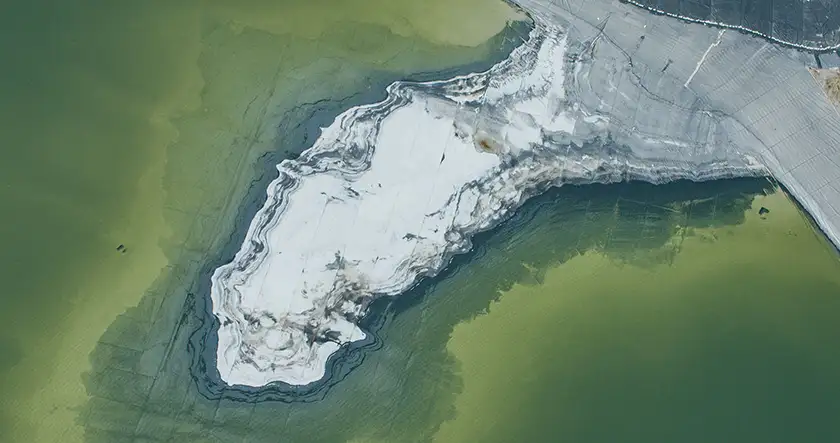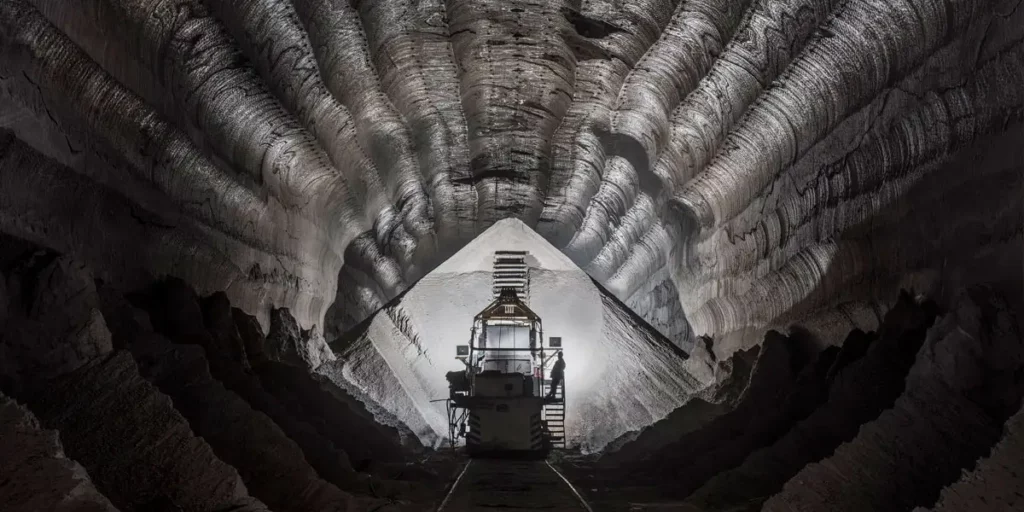Anthropocene: The Human Epoch is an eye-opening Canadian documentary about the severity of humans’ impact on the Earth.
Born from Jennifer Baichwal’s collaboration with Edward Burtynsky and Nicholas de Pencier and beautifully narrated by Alicia Vikander, Anthropocene: The Human Epoch was inspired by the research of the Anthropocene Working Group. This group is an actual “collection” of scientists, biologists, archaeologists, earth system scientists and geologists, who have been investigating and gathering evidence and data for about twelve years, trying to determine how humans impacted the planet, causing the beginning of the Anthropocene epoch. This beautiful documentary premiered at the 2018 Toronto International Film Festival and won two Canadian Screen Awards in 2019, for Best Feature Length Documentary and Best Cinematography in a Documentary.
Anthropocene: The Human Epoch completes a trilogy of movies that began with Manufactured Landscapes (2006) and Watermark (2013), also made by the same creators, and is part of a bigger body of work. This includes two major museum exhibitions, an art photography released by Burtynsky, interactive experiences in augmented and virtual reality (apparently the ultimate empathy tool) and an art book published by Steidl. Baichwal, Burtynsky and de Pencier’s goal was to convey all the scientific data in a way that was accessible to “ordinary” people, using all available medias.
The authors explained in an interview that they wanted to provide the audience with the necessary information to accompany the images on the screen, but in a way that wouldn’t take their attention away from it. Given the numerous words that are not known or familiar to many (Terraforming, Technofossils, Anthroturbation to name a few), they decided that narration was going to serve and complement the project best. Baichwal was adamant that “the voice of God was not going to be a man” (as she pointed out, it almost always is), so they started looking for an actress whose work was respected, and who also was an environmentalist. Oscar winner Alicia Vikander, globally known for her performance in movies like Ex Machina, The Danish Girl and Tomb Raider, was chosen to lend her soothing voice to narrate the documentary, adding a further layer of emotion, compassion and sadness to it.
Her voice only fills some of the silent moments, where necessary, and helps contextualize the powerful and beautiful images that appear on screen, letting them ‘speak’ to the viewers in a way that lets them understand what they are looking at without judgement or prejudice, simply allowing them to ‘feel’.

“After over a decade of extensive research, scientists confirmed we left the Holocene epoch and entered the Anthropocene epoch.” But what does the word Anthropocene mean? Atmospheric scientist Paul Crutzen introduced the term in the mid-1970s, suggesting it to identify a new geological epoch dating from the commencement of significant human impact on Earth’s geology and ecosystems, including, but not limited to, anthropogenic climate change.
The documentary is structured in segments (Extraction, Terraforming, Anthroturbation, Boundary Limits, Climate Change, Extinction), giving a clear picture of all the exploiting man-made activities that are slowly – or not so slowly – exploiting and destroying the planet. The most visually and emotionally impactful segment of all is the one about Terraforming, which is the process whereby a “hostile” environment is altered in order to become suitable for human life. This could involve modifying the temperature, atmosphere, surface topography and ecology – or all of the above. This sequence of the film delivers a real sense of gravity, pointing out that humans are irrefutably changing and contorting the face of the Earth more than all the natural processes combined.
Some of the scenes of this extraordinary piece seem to have been taken out of a science fiction movie. Think of Mad Max – Fury Road or Blade Runner 2049. In fact, Blade Runner 2049 director Denis Villeneuve actually admitted to having used Baichwal, de Pencier and Burtynsky’s movies and photographs for his film’s “look book”/mood-board. As visually beautiful as Anthropocene’s scenes are within the context of a fiction film, they do look terrifying if you think about the fact that they are real.
Extinction is the ultimate flag that marks the Anthropocene epoch, and towards the end of the documentary, Vikander’s gentle voice tell us that “the Earth has had 5 major extinctions and we are now in the middle of the 6th Great Extinction, this time because of human impact.” It has been calculated that extinction rates are now 10.000 times higher than natural rates from Habitat loss, Poaching, Pollution, Hunting, Climate Change and Hunting, and scientists have been looking for evidence to proof that humans are leading themselves towards that direction; but one of the limitations of Geology is that it is almost impossible to measure extinction. As Bachwal said in a recent interview, “How can you look at what is absent? How do you convey absence in general?”
These days, there are very few opportunities for us to have a sustained reflection on what kind of impact human beings are having on the Earth. Anthropocene: The Human Epoch puts us face to face with some of the most endangered or nearly extinct animal species, making us experience a sense of loss, guilt, doom. Baichwal’s beautifully comprehensive project demands our attention, aiming to slow down our heart rate and ultimately destabilize us. By moving us into compassion, Anthropocene creates awareness, discussion and hopefully action.
We have indeed moved the planet outside its natural limits. Have we lost our way to such extent that it’s impossible for us to get our planet back? I believe that it falls on us to protect and preserve this wonderful planet that has been sustaining us for so long.
Anthropocene: The Human Epoch will be available to watch at home on 25th June, as part of the Edinburgh International Film Festival 2020, exclusively on Curzon Home Cinema.

